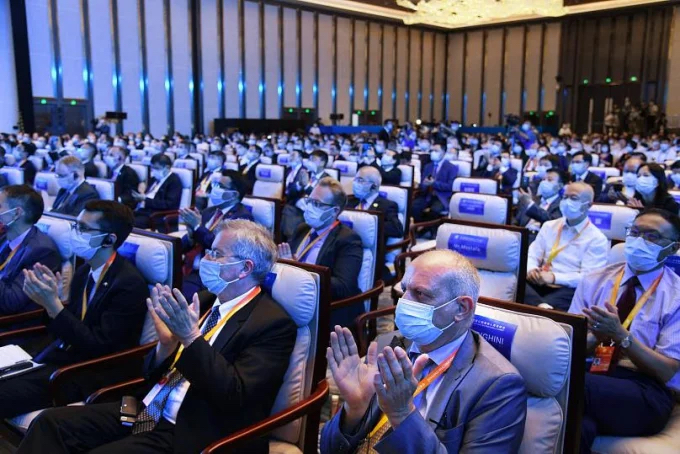Held under the gleaming and sinuous curves of China Railway Qingdao Expo City, this year’s Multinationals Summit exceeded all expectations, with 10,000 people attending online and in person.

Buoyed by the success of the inaugural summit in 2019, this year’s event attracted business executives from 390 Fortune 500 companies, diplomatic envoys to China from 15 different countries and over 500 industry leaders.
Multinational presidents, VPs and CEOs praised the series of meetings, talks and conferences, along with the organisational prowess of the government of the Shandong Province, describing it as “hospitable”, “innovative” and “dynamic”.
“The number and the level of companies attending is really astonishing,” said Guido Giacconi, vice-president of the European Union Chamber of Commerce in China. He added that the summit would help improve understanding and cooperation between the European Chamber and government leaders in China.
China’s position as the second largest economy in the world, its agility in leveraging trade opportunities, its huge domestic market and its industrial infrastructure have long made it an attractive prospect for investment and collaboration. Its recent, decisive measures to reduce the spread of the COVID-19 pandemic and stabilize its economy have also served to boost international confidence and this was reflected in the high level of corporations and representatives attending the summit.
Many guests praised the natural surroundings of Qingdao itself. On the coast of the Yellow Sea, it’s a popular tourist spot, known for its film industry, architecture and much-loved Tsingtao beer.
With a major port and impressive transport links to the rest of China and beyond, Qingdao has long been a popular place for multinationals to come together. Among the 166 Fortune 500 companies found here are Panasonic, Samsung and Airbus.
 Cooperation between nations and companies for a brighter future
Cooperation between nations and companies for a brighter future
The two-day event opened on July 15 with the aim of seeking common goals, cementing friendships and looking for mutually beneficial collaboration. The stated goals also included creating a high-end platform for dialogue between transnational corporations and political and academic circles, and President Xi Jinping’s determination to open up China to the world was always at the forefront.
“The summit itself conveys a positive signal that China is willing to build an open global economy with other countries,” said Tracy Xie, president of global mining company Vale China, which has its headquarters in Brazil.
Across a wide range of activities, exhibitions and meetings, key topics included intellectual property rights, the development of the Yellow River Basin, transnational cooperation and the green economy.
“The goal of sustainability will not be achieved by just one company, one city, or even one country, but requires that we all work together in an ecosystem,” said Visal Leng, president of Johnson Controls Asia-Pacific. Talking about the governments of Shandong Province and the country itself, he said “The focus on sustainability and decarbonisation is great news for us. This is what Johnson Controls is all about.”
There was widespread support at the summit for China’s aim to hit peak emissions by 2030 and carbon neutralisation by 2060. Across the whole range of industries represented at the event there was keen interest in China’s investment in green development.
Cooperation between multinationals and financial entities is needed for this to happen, and the summit provided plenty of opportunities for participants to forge alliances. Yamato Kenichi, president of the Tokyo-Mistubishi UFJ bank in China, said,“More and more Chinese companies are committed to energy conservation and emission reduction and our bank is keen to provide corresponding financial services to those businesses.”
Closed-door meetings, panel discussions, and city and company roadshows held over the two days provided further opportunities to strengthen cooperation and understanding. To this end, a report titled ‘Multinationals in China: New Opportunities Arising From a New Paradigm’ was released to participants by the Chinese Academy of International Trade and Economic Cooperation (CAITEC), a think tank of the Ministry of Commerce.




